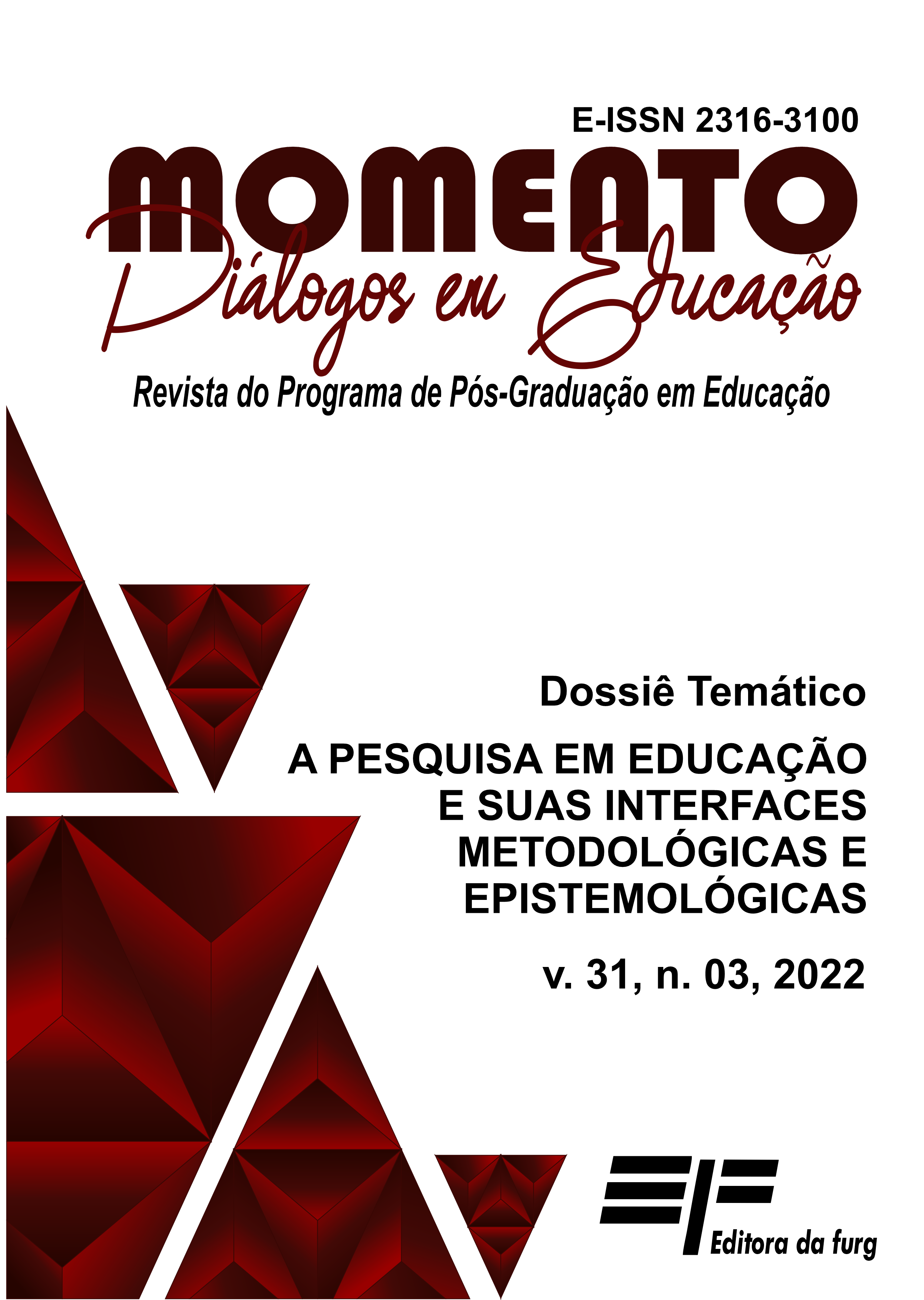THE VERBO GRAMMATICAL CATEGORY AND NORMATIVE ISSUES INVOLVING BRAZILIAN PORTUGUESE
DOI:
https://doi.org/10.14295/momento.v31i03.13943Keywords:
Applied Linguistics; Verb category; Brazilian Portuguese.Abstract
The present investigation, resulting from a Master's research, is situated in the field of Applied Linguistics (AL) for debating the linguistic-grammatical category verb in the teaching context, as well as in the dialogic context and aims to verify the limitations of the normative aspects that involve the grammatical category verb in Brazilian Portuguese (BP), specifically with regard to the conceptualization of the verb in the coexistence of its pragmatism (AZEREDO, 2015; FERRAREZI JUNIOR, 2014; VIEIRA, 2018). The data come from a bibliographic review carried out from Brazilian school grammars. What we observe is that there are normative definitions attributed to the verb category that necessarily need to be rethought due to the idiosyncrasy exerted by the verb category and that Traditional Grammar (TG) does not meet the applied linguistic dimensions.
Downloads
References
ANTUNES, Irandé. Assumindo a dimensão interacional da linguagem. In: ANTUNES, Irandé. Aula de português: encontro e interação. São Paulo: Parábola Editorial, 2003.
ANTUNES, Irandé. Gramática contextualizada: limpando o pó das ideias simples. 1. ed. São Paulo: Parábola Editorial, 2014.
AZEREDO, J. C. O tempo do verbo e a lição dos velhos gramáticos. In: André C. Valente. Unidade e variação na língua portuguesa: suas representações. São Paulo: Parábola Editorial, 2015. cap. 13.
BAGNO, Marcos. No princípio era o verbo. In: BAGNO, Marcos. Gramática Pedagógica do Português Brasileiro. São Paulo: Parábola Editorial, 2011. cap. 12.
BECHARA, Evanildo. Verbo. In: BECHARA, Evanildo. Moderna gramática portuguesa. 37. ed. Rio de Janeiro: Nova Fronteira, 2009. cap.6.
BORGES NETO, J. De que trata a linguística afinal? In: BORGES NETO, J. Ensaios de filologia da linguística. São Paulo: Parábola Editorial, 2008, p. 31- 49.
BORGES NETO, J. Gramática tradicional e linguística contemporânea: continuidade ou ruptura? Todas as Letras, vol.14, n.1, 2012. São Paulo: Mackenzie, p. 87-98.
BORTONI-RICARDO, Stella Maris [et al.]. Por que a escola não ensina gramática assim? 1.ed. São Paulo: Parábola Editorial, 2014.
CÂMARA JR, Joaquim. A classificação dos vocábulos formais. In: CÂMARA JR. Estrutura da língua portuguesa. 33. ed. Petrópolis: Vozes, 2001. p. 77-80.
CASTILHO, A. T. Nova gramática do português brasileiro. São Paulo: Contexto, 2010.
CEGALLA, D. P. Novíssima gramática da língua portuguesa. 48.ed. São Paulo: Companhia Editora Nacional, 2008.
CUNHA, Celso; CINTRA, Lindley. Verbo. In: CUNHA, Celso; CINTRA, Lindley. Breve Gramática do português contemporâneo. Lisboa: Joao Sa de Costa, 2006[1984]. cap. 13. Disponível em: https://kupdf.net/download/celso-cunha-breve-gramatica-do-portugues-contemporaneo_ 59 8db28fdc0d60157e300d1b_pdf. Acessado em: 5 de junho de 2019.
FERRAREZI JUNIOR, Celso. O estudo dos verbos na educação básica. São Paulo: Contexto, 2014.
FRANCHI, Carlos. Criatividade e gramática. In: NEGRÃO, E.V.; MÜLLER, A. L. (Orgs.). Mas o que é mesmo gramática? São Paulo: Parábola Editorial, 2006, p. 34-101.
FRANCHI, Carlos. Mas o que é mesmo “gramáticaˮ? In: NEGRÃO, E.V.; MÜLLER, A. L. (Orgs.) Mas o que é mesmo gramática? São Paulo: Parábola Editorial, 2006, p. 11-33.
FREITAS, V. A de L. SOUSA, M. A. F. de. Verbos impessoais: variação no uso de haver, ter e fazer. In: Stella M. Bortoni-Ricardo [et al.]. Por que a escola não ensina gramática assim? 1. ed. São Paulo: Parábola Editorial, 2014. cap. 6.
GIL, Antônio Carlos. Métodos e técnicas de pesquisa social. - 6. ed. - São Paulo: Atlas, 2008.
NEVES, Maria Helena da Moura. A gramática funcional. São Paulo: Martins fontes, 1997.
______ . Funcionalismo e linguística do texto. Revista do GEL, São Paulo, v 1, n. 1. p. 71-89, 2003. Disponível em: https://revistadogel.emnuvens.com.br/rg/article/viewFile/292/196. Acessado em: 9 de junho de 2019.
TRAVAGLIA, Luiz Carlos. Gramática e Interação: uma proposta para o ensino de gramática. 14. ed. São Paulo: Cortez, 2009.
VIEIRA, Francisco Eduardo. A gramática tradicional: história crítica. 1. ed. São Paulo: Parábola editorial, 2018.
VITRAL, Lorenzo. Ensino de gramática na contemporaneidade. Work. Pap. Linguíst. 18(2) 239-257, Florianópolis, ago./dez., 2017. Disponível em: https://doi.org/10.5007/1984- 8420.2017v18n2p239. Acessado em: 5 de junho de 2019.
Downloads
Published
How to Cite
Issue
Section
License
Copyright (c) 2022 Momento - Diálogos em Educação

This work is licensed under a Creative Commons Attribution 4.0 International License.
À Revista Momento − Diálogos em Educação, ficam reservados os direitos autorais, de todos os artigos nela publicados.


